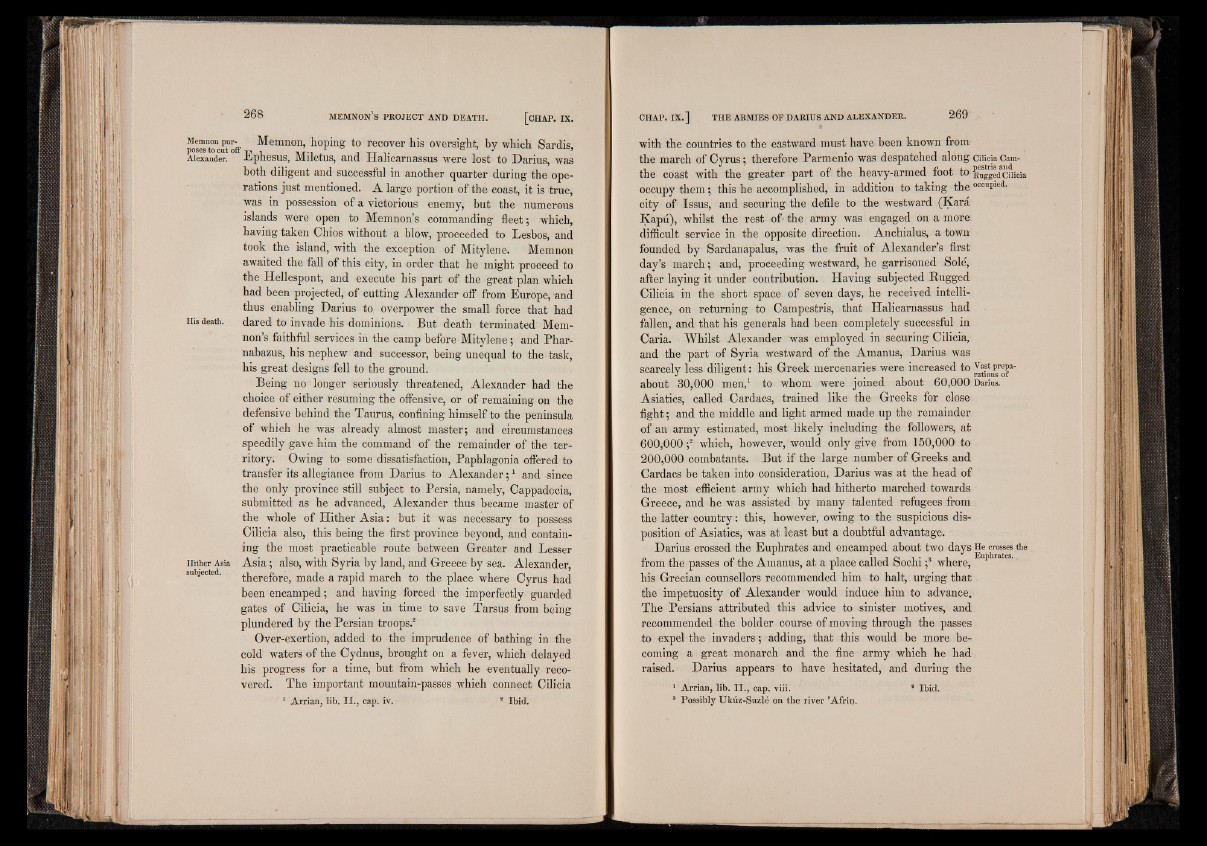
268 MEMNON'S PROJECT AND DEATH. [CHAP. IX.
Memnon, hoping to recover his oversight, by which Sardis,
Alexander. Ephesus, Miletus, and Halicarnassus were lost to Darius, was
both diligent and successful in another quarter during the operations
just mentioned. A large portion of the coast, it is true,
was in possession of a victorious enemy, but the numerous
islands were open to Memnon’s commanding fleet; which,
having taken Chios without a blow, proceeded to Lesbos, and
took the island, with the exception of Mitylene. Memnon
awaited the fall of this city, in order that he might proceed to
the Hellespont, and execute his part of the great plan which
had been projected, of cutting Alexander off from Europe, and
thus enabling Darius to overpower the small force that had
His death. dared to invade his dominions. But death terminated Memnon’s
faithful services in the camp before Mitylene; and Phar-
nabazus, his nephew and successor, being unequal to the task,
his great designs fell to the ground.
Being no longer seriously threatened, Alexander had the
choice of either resuming the offensive, or of remaining on the
defensive behind the Taurus, confining himself to the peninsula
of which he was already almost master; and circumstances
speedily gave him the command of the remainder of the territory.
Owing to some dissatisfaction, Paphlagonia offered to
transfer its allegiance from Darius to Alexander; 1 and since
the only province still subject to Persia, namely, Cappadocia,
submitted as he advanced, Alexander thus became master of
the whole of Hither Asia: but it was necessary to possess
Cilicia also, this being the first province beyond, and containing
the most practicable route between Greater and Lesser
Hither Asia Asia; also, with Syria by land, and Greece by sea. Alexander,
snbjecte . therefore, made a rapid march to the place where Cyrus had
been encamped; and having forced the imperfectly guarded
gates of Cilicia, he was in time to save Tarsus from being
plundered by the Persian troops.2
Over-exertion, added to the imprudence of bathing in the
cold waters of the Cydnus, brought on a fever, which delayed
his progress for a time, but from which he eventually recovered.
The important mountain-passes which connect Cilicia
1 Arrian, lib. I I ., cap. iv. 2 Ibid.
CHAP. IX .] THE ARMIES OF DARIUS AND ALEXANDER. 269
with the countries to the eastward must have been known from
the march of Cyrus; therefore Parmenio was despatched along Cilicia Cam-
the coast with the greater part of the heavy-armed foot to 5ju ggC(i Cilicia
occupy them; this he accomplished, in addition to taking the °“ “Pied-
city of Issus, and securing the defile to the westward (Kara
Kapu), whilst the rest of- the army was engaged on a more
difficult service in the opposite direction. Anchialus, a town
founded by Sardanapalus, was the fruit of Alexander’s first
day’s march; and, proceeding westward, he garrisoned Sole,
after laying it under contribution. Having subjected Rugged
Cilicia in the short space of seven days, he received intelligence,
on returning to Campestris, that Halicarnassus had
fallen, and that his generals had been completely successful in
Caria. Whilst Alexander was employed in securing Cilicia,
and the part of Syria westward of the Amanus, Darius was
scarcely less diligent: his Greek mercenaries were increased to
about 30,000 men,1 to whom were joined about 60,000 Darius.
Asiatics, called Cardacs, trained like the Greeks for close
fight; and the middle and light armed made up the remainder
of an army estimated, most likely including the followers, at
600.000 ;2 which, however, would only give from 150,000 to
200.000 combatants. But if the large number of Greeks and
Cardacs be taken into consideration, Darius was at the head of
the most efficient army which had hitherto marched towards
Greece, and he was assisted by many talented refugees from
the latter country: this, however, owing to the suspicious disposition
of Asiatics, was at least but a doubtful advantage.
Darius crossed the Euphrates and encamped about two days He crosses the
from the passes of the Amanus, at a place called Sochi ;s where,
his Grecian counsellors recommended him to halt, urging that
the impetuosity of Alexander would induce him to advance.
The Persians attributed this advice to sinister motives, and
recommended the bolder course of moving through the passes
to expel the invaders; adding, that this would be more becoming
a great monarch and the fine army which he had
raised. Darius appears to have hesitated, and during the
1 Arrian, lib. I I ., cap. viii. 2 Ibid.
3 Possibly Ukuz-Suzle on the river ’Afrin.